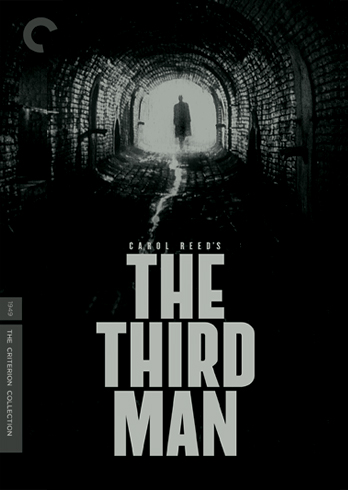I have a touch of the OCD (and don’t we all?) and was going through my DVD collection, which at this writing is I think 809 and counting. Yes. That’s a lot. But my brother, who is a filmmaker and he should know, always insisted that a good film library is key to any true cinema aficionado. Okay, he didn’t say it quite like that, it’s my spin. But you get the gist.
Anyway, getting things in order I realize I always want people to see the movies I have and to enjoy them. So I figured why not recommend some here. It’s not my “greatest movies of all time” AFI pretentious bullshit sort of list. I kinda went randomly through and just jotted them down.
The Third Man (1949) – Okay, I had to put this one first to get it out of the way, because when I am pegged to name my favorite movie of all time, this is it. I’ve loved it and admired it since the first time I saw it. Joseph Cotten was never better. Carol Reed’s direction is among the best in film history, as well as his use of post-war Vienna as something noirish and sinister. And as always there’s the cuckoo clock monologue. And the jaunty and bizarre zither score.
Don’t Look Now (1973) – Julie Christie and Donald Sutherland are parents in Venice mourning the accidental drowning of their daughter. Directed by Nicolas Roeg, it’s symbolism is fierce and its suspenseful build starts out deliberately paced, but by the last twenty minutes of the shocking climax, it’s overwhelming. Detailed, nuanced and with one of the most famous love scenes in film history (which, really folks, is more beautiful and heart-breaking than ironic). Add a bizarre priest, a blind psychic and her sister, a series of murders and a Venice that is frighteningly sinister and unwelcoming and you’ve got one of the most impressionable horror films of the ’70s.
His Girl Friday (1940) – Cary Grant and Rosalind Russell star in the fast-paced, rapid fire remake of The Front Page (only with a gender-bend that improves upon the original) about a snake-oil salesman of an editor who is trying to keep his ex-wife and former star-reporter from getting remarried (but all the while landing the story of a convict being executed for political motivations). Satiric, screwball and brisk, its one of the most rewatchable comedies of the screwball era. I can never not watch it if it is on TV and will pop it in when I need a pick-me-up.
The Lion in Winter (1968) – I love Katharine Hepburn. I love Peter O’Toole. And together, they create one of the most riveting period dramas of all time in this adaptation of James Goldman’s play about Henry II and Eleanor of Aquitaine’s war over who will inherit the throne of England. Hepburn tied for the Oscar, in what I think is my second favorite performance of hers (trumped only by her spellbinding work in The Lion in Winter). Anthony Hopkins, Timothy Dalton and John Castle provide ample support.
Howards End (1992) – I’m a stickler for period films. Especially British costume period films. Merchant-Ivory’s adaptation of Forster’s novel is one of the most superb adaptations of a literary work to screen. Emma Thompson, one of my favorite actresses, won the Best Actress Oscar heading the cast which includes a headstrong Helena Bonham Carter, a staid Anthony Hopkins and a resplendent Vanessa Redgrave. Such attention is paid to detail and nuance in every facet.
The Remains of the Day (1993) – Consider it a double-bill. I love both movies so much, I’ve never been able to decide if I prefer one over the other. Made immediately following Howards End and it’s enormous success, Merchant-Ivory teamed once again with Emma and Anthony, this time taking us to the rural manse of a nobleman who is a Nazi-sympathizer working towards appeasement with the Germans prior to WWII. However, the heart of the story is the repressed and unspoken love between the housekeeper and butler (the latter being so good at his job, he fails to convey his feelings); with quietly devastating results. Damn, I love these two.
The Manchurian Candidate (1962) – A chilling satire on American politics and the Cold War scare (suggesting that the extreme of both the left and right become the same thing). Sinatra, Laurence Harvey and Janet Leigh star in this tale of brainwashing, Communist intrigue and assassination. The film becomes legendary as a result of Angela Lansbury’s scene-stealing supporting turn as Mrs. Iselin, one of the most memorable characters ever presented on film and a marvel of screen-acting from Lansbury, who should have won the Oscar for her performance, the best of her career. Forget the bland, insipid and totally unnecessary remake with Meryl Streep and Denzel Washington.
All About Eve (1950) – The greatest movie ever made about the theater. Even now, the dialogue crackles with caustic wit and the story remains timely. Bette Davis as Margo Channing. That’s about as iconic as you can get. Such perfect support from Anne Baxter, Celeste Holm, an Oscar-winning George Sanders and the always-dependable Thelma Ritter in one of her no-nonsense, down-to-earth roles. Davis has one of the best exit lines I’ve ever seen in a movie. I just picked up the recently released 2-disc special edition with a newly restored print. I’ll be writing about that when I get the chance to take a look.

